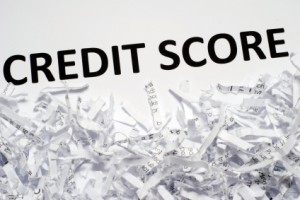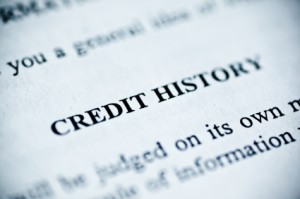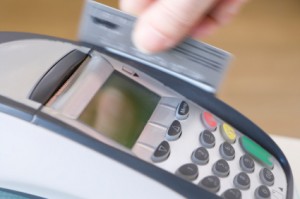May 21st, 2010
 When you have a small business, it’s easy to think of it as a separate entity with expenses and debts unrelated to your own. The fact that most credit card issuers don’t report your business credit card activity on your personal credit report file adds to the misconception. When you have a small business, it’s easy to think of it as a separate entity with expenses and debts unrelated to your own. The fact that most credit card issuers don’t report your business credit card activity on your personal credit report file adds to the misconception.
And that makes it easy to get your business deep into credit card debt.
Because small business people believe that they need to put on a good front to customers, clients, and even employees, it becomes easy to over-spend on non-essentials, or even unproven advertising venues. And, when cash flow is not flowing well, it becomes easy to lean on the credit card.
This was especially true when credit card companies were filling mailboxes with checks pre-written for $3,000, $5,000 and more – but it is still a danger today.
Most small business entrepreneurs share a basic optimism that things really will be better tomorrow. So it’s easy to say: “Well just use this check to pay this months’ expenses, and by next month we’ll have the money to pay it back.”
If you have a business credit card, think twice before you use it. Is this purchase or expense essential? And if it is essential, do you need to spend this much? You may actually need a new desk chair, but do you need the $500 chair? Perhaps the $150 chair will do just as well.
Obviously, if you have payroll to meet or tax payments to deposit before you’ve received customer payments, having the credit card to fall back on is a big help. And if you have a lot of miscellaneous expenses such as gasoline, office supplies, and meals, the credit card accounting services can help you keep track of spending. Used as a tool, your business credit card can be an asset.
But carrying a balance from month to month can drag your business down and cause you to spend too much of your hard earned money on interest.
Business credit cards are not covered under the Credit CARD Act. That means carrying a balance in today’s economy is dangerous. The credit card issuer can and might raise your rate at any time – and they’re not required to warn you ahead of time. $20 in interest charges last month could easily turn into $50 next month.
So get a business card and use it for the convenience and the bookkeeping features – but strive to avoid carrying a balance.
Author: Mike Clover
CreditScoreQuick your online resource for credit cards and credit reports.
Posted in Uncategorized | Comments Off
May 21st, 2010
 Maintaining your good credit scores is more difficult today than it was in the past, but these steps will help. Maintaining your good credit scores is more difficult today than it was in the past, but these steps will help.
The first and most obvious step is to always pay your bills on time. Those little dings on your credit report caused by late payments will chip away at your scores.
Next is to pay your credit card bills in full. Good money management means not buying things that you can’t really afford. So use the credit card for convenience or to get rewards, but then pay the bill. You’ll be free from interest payments – making your income go farther and giving you peace of mind.
Stay far, far away from your credit card limits – on every card.
This is the credit score protection that’s most difficult today, because so many credit card issuers decided to reduce credit lines, even for their best customers. The safest limit is to stay below 30% of your available credit. So if you have a $10,000 credit line, never let your bill go beyond $3,000.
But what if you need to make a purchase that brings you above 30% – and it has to go on a credit card? Some merchants don’t take checks, and an on-line purchase with a check can take days because the merchant will wait for the check to clear before shipping your merchandise.
If you are able to pay for the purchase in full, first check your credit card statement dates. Make sure the purchase you make today won’t be on a statement that’s issued tomorrow. If you’re close to the statement date, wait until your new statement is posted before you make your purchase.
Then go on line and pay your bill ahead of time. If you aren’t able to pay in full, pay enough to bring your balance back under 30% of your available credit.
Credit card issuers only report your statement balance. So by paying before your statement is issued, you’ll avoid the damage to your credit scores.
Next, if you’re shopping, never give your Social Security number to merchants who might make inquiry in anticipation of extending credit to you. Wait until you’ve made a decision on a purchase before giving private information, because multiple inquiries bring your scores down. So whether it’s a merchant account or a new credit card, if you want new credit, go after it slowly.
Finally, keep a close eye on your credit report. Errors and identity theft can destroy your credit rating, so they need to be caught and corrected quickly.
Author: Mike Clover
CreditScoreQuick.com
Posted in Uncategorized | Comments Off
May 20th, 2010
 Establishing credit should be one of the first steps as young people enter the world of work. Establishing credit should be one of the first steps as young people enter the world of work.
Good credit will enable them to get better jobs, rent a home, buy insurance, sign up for cable TV, and of course – purchase a car and a house when the time is right.
There’s no way to hurry the process, so getting started right away is important.
The first step is to order a copy of your free online credit report to see where you stand. One young man was shocked last year when he learned he had bad credit – for a credit card that someone had taken out under his Social Security number when he was only about 9 years old.
So get your free report, with scores, and read it carefully. If you find errors, or signs of identity theft, now is the time to deal with them.
Next, you need to establish different kinds of credit – one at a time. Choose one, apply, and get established before making the next application.
A retail store or gas credit card is easier to get than a major credit card, so is a good starting point. So is a secured credit card. If necessary, get a family member with established credit to co-sign for this first card.
Then, use it carefully. Keep a balance of no more than 30% of your credit limit and always pay on time.
Once you’ve established yourself with a credit card, take out a small installment loan with a local bank or credit union. This can be as small as $500. The important thing is that you make the payments on time every month.
Creditors want to see that you can manage money – so don’t take out the loan one month and pay it in full the next. Those regular payments build your credit scores.
Purchasing from a retail store on credit is another way to establish yourself, but first check to see that the store you choose does report to the credit bureaus.
Once you’ve established these lines of credit, consider buying a good used car on credit. The interest rate will be slightly higher than that for a new car, but the payments will be considerably less, and the last thing you want to do starting out is stretch your budget to its limits.
Whatever your new wages or salary, strive to put 10% away to invest for the future. You never know when opportunity will knock – and if you have the funds you’ll be able to answer.
Author: Mike Clover
CreditScoreQuick.com
Posted in Uncategorized | Comments Off
May 19th, 2010
 While credit card issuers gnashed their teeth and took immediate steps to raise interest rates and implement new revenue streams last year, consumers who use credit cards waited in happy anticipation for the reforms to become effective on February 22, 2010. While credit card issuers gnashed their teeth and took immediate steps to raise interest rates and implement new revenue streams last year, consumers who use credit cards waited in happy anticipation for the reforms to become effective on February 22, 2010.
And it turns out that those reforms really are helping consumers.
The number of borrowers who fell 90 days or more behind on credit card payments during the first quarter of 2010 dropped by nearly 16% – from 1.32% to 1.11% – over the same period last year. In addition, average credit card debt is down 10.6% from the same period in 2009.
Analysts believe that one reason for the drop in late payments is that banks can no longer raise interest rates on existing balances. Prior to the CARD Act, banks could hike interest rates with no real warning – causing minimum payments to jump at a time when many Americans were struggling with unemployment and reduced income.
Consumers can still be faced with small rate increases, depending upon the terms of their credit cards. One thing many credit card issuers did last year was to switch from a fixed rate to a variable rate tied to Prime. Thus, when the Prime rate rises, interest on those credit cards rises with it.
However, at least for now, the Prime rate is staying low and isn’t changing much from month to month. It’s a far cry from seeing an interest rate jump from 7.9% to 17.9% in one month.
The new law also curbed some of the fees banks charged. For instance, a consumer who went over-limit on a credit card account now pays just one over-limit fee per billing period rather than a separate fee for every transaction that took his or her account over the credit limit.
In the past, these over-limit fees increased consumer debt faster than many could pay it down.
The new law is also making it easier to pay down debt, by mandating that all payments above the minimum are credited to the highest interest balance first. Previously, a consumer might have a high interest purchase balance buried beneath a low-interest cash advance – where its interest charges continued to add to the debt month after month.
Of course, another reason for this decline is that Americans are working to rein in their debt. We’re working harder to live within budgets and to pay off credit accounts rather than acquire new debt. In fact, TransUnion reported that the number of new cards opened during the first quarter of 2010 was down 24% from the same period last year.
Author: Mike Clover
CreditScoreQuick.com

Posted in Uncategorized | Comments Off
May 18th, 2010
 Advice is one commodity that never experiences a shortage – everyone has some to give you. Advice is one commodity that never experiences a shortage – everyone has some to give you.
When the subject is credit, following some of the advice will harm your scores, while some of it will make life more expensive.
For instance, you may have heard that you should never shop for a home loan because every inquiry will “ding” your credit score. This is a falsehood that can cost you money.
The truth is, when it comes to home loans, there’s a 30-day window in which all credit inquiries from mortgage lenders are lumped together and treated as one. It seems that the folks Fair Isaac realized that shopping for the best interest rate is a smart move – and no bank will quote a firm rate without seeing your credit scores.
Along that same line of thought, many still believe that checking your own credit scores will damage your credit. This is a falsehood that goes back to the time when the only way to learn your credit rating was to have a lender check it. The score keepers assumed that an inquiry meant an attempt to borrow money.
The only part of this that’s true is that you should still avoid letting a lender or a merchant check your credit for you. Their inquiries will still lower your scores. Checking your own has no impact on your credit scores at all, and is a wise financial practice.
Because errors in credit reporting are rampant and because identity theft is on the rise, keeping track of your credit report and scores is important.
What about credit card use? Financial advisors tell consumers to close their credit card accounts and to use any extra funds to pay off accounts with the highest interest as quickly as possible. Both of these moves can harm your credit scores.
The more credit you have available that you do not use, the better the impact on your credit scores. Thus, when you close an account, your scores will dip. So while you should never use all your credit, you should keep it available.
As for which cards to pay first – Of course you’ll save money if you pay the highest interest card first. But to keep your scores at their highest, first pay off the card with the largest ratio of use.
Say you’ve used 60% of your available credit on a low rate Visa card, but have used only 20% of the funds available on a high-interest MasterCard.
Because credit scoring looks at the ratio of use on each individual card rather than the aggregate, your scores will improve by quickly bringing that Visa balance down.
So if you aren’t going to need new credit soon, definitely pay off the high interest balance first. But if you’re more interested in raising your credit scores, pay off the high use card first.
Author: Mike Clover
CreditScoreQuick.com

Posted in Uncategorized | Comments Off
May 17th, 2010
 Being a lender and hearing just about everything under the sun on the web, is what prompted me to write about credit. I read all kinds of information in regards to annualcreditreport.com and credit reports in general. The one thing I never hear is the negative side to the FTC mandated site www.annualcreditreport.com. Let me ask you this. Do you think creditors pull your credit report without credit scores? The answer is no…. Your credit score is the single most important number you will ever encounter. Here is what annualcreditreport.com does and does not offer free once a year. Being a lender and hearing just about everything under the sun on the web, is what prompted me to write about credit. I read all kinds of information in regards to annualcreditreport.com and credit reports in general. The one thing I never hear is the negative side to the FTC mandated site www.annualcreditreport.com. Let me ask you this. Do you think creditors pull your credit report without credit scores? The answer is no…. Your credit score is the single most important number you will ever encounter. Here is what annualcreditreport.com does and does not offer free once a year.
The positive side to annualcreditreport.com
When you go to this site, you do get your credit report from each bureau for free once a year. Or you probably have read you can space out your credit report and get a copy from each credit bureau once ever 4 months or so for free. This site does not make you enter credit card number on a trial basis for your report either. This is the good side to this offer mandated by the government.
The negative side to annualcreditreport.com
When you go to annualcreditreport.com to get your free once a year credit report, you will not get your credit scores. You also don’t get any type of credit monitoring at this site for free. Do you think pulling your credit report once a year is good enough for proper credit management? The answer to this is no, you need to pull your credit report every two to three months. Did you know that your credit score can change within 30 days because of inaccuracies on your credit report? Most people don’t know this and assume pulling your credit report once a year without any credit scores is sufficient. Recent studies show that most credit reports have the wrong information being reported on them that can ultimately affect your credit rating. Did you know the first thing banks, auto lenders, credit card companies look at is your credit score?
When I pull credit reports for potential borrowers, I find that most of the reports have information on them that are incorrect. I ask the potential borrower when was the last time you check your credit. The answer is usually never….. This is an invitation for most lenders to take advantage of you, by charging high rates and high fees.
Annualcreditreport.com is a good tool, but is not the complete solution for proper credit management. If you are looking to get your credit report, you must consider getting your credit scores as well. A price of $17 to $20 bucks to see your credit scores is a small price to pay to save on high interest rates and outragous fees on loans. Also remember you need to see your credit score from each credit bureau. Credit Bureaus are always different in regards to how they score you and report information about you.

Author: Mike Clover
CreditScoreQuick.com
Posted in Uncategorized | Comments Off
May 15th, 2010
 Last year, when the government decided to boost new car sales by offering “Cash for Clunkers,” some of us worried that this incentive would do more harm than good. And for many, that worry has become a reality. Last year, when the government decided to boost new car sales by offering “Cash for Clunkers,” some of us worried that this incentive would do more harm than good. And for many, that worry has become a reality.
Now, thousands who were content driving a “paid for” older car are driving new cars with hefty payments. And unfortunately, many of those thousands are now among the unemployed.
If you’re among those who are wishing you’d stayed with that old car, here’s what you need to know:
Being unable to make car payments can be just as damaging to credit scores as being unable to make house payments. Late payments will give you a black mark, and a car repossession will stay on your credit score for 7 years. That will make it difficult, if not impossible, to get another car loan after you’ve gotten back to work and can once again afford the payments.
Before you give up and let the bank take the car, contact your lender and discuss having your loan modified. You may be able to extend the payment period in order to lower the payments to a manageable level.
If that won’t work, or if you feel you can’t make any payments at this time, try to sell the car yourself. Even if you have to come up with a few hundred dollars to make up the difference between the selling price and what you owe, you’ll save your credit scores.
Plus, the difference you’ll need to pay will be less than the difference you might have to pay if your lender repossesses the car. You see, lenders sell cars at auction, and auctions bring less than a private sale. And, you’ll be held responsible to make up the difference.
If you can’t negotiate a longer loan term and can’t find a buyer for the car, consider a voluntary repossession. This will give you the opportunity to negotiate with your lender to reduce or eliminate the shortage you’ll be required to pay. In addition, surrendering a car makes lenders view you in a more positive light, so you may be able to purchase another car sooner.
Do keep in mind that even if your lender forgives a portion of your debt, you’ll need to pay income tax on the forgiven amount. The government considers such forgiveness a monetary gift, and they want their share!
CreditScoreQuick.com
Posted in Uncategorized | Comments Off
May 11th, 2010
 You thought just making good grades was important, but now your credit score is just as important. Unfortunately there is not much taught about your credit score in the classroom. Since I am a 9 year veteran banker, I will give you the FACTS on how to keep your credit score high. You thought just making good grades was important, but now your credit score is just as important. Unfortunately there is not much taught about your credit score in the classroom. Since I am a 9 year veteran banker, I will give you the FACTS on how to keep your credit score high.
1. Don’t ever be late on any payments that report to the credit bureaus. If you are late, you can kiss your credit score good bye…. Typically a late payment will drop your credit score 100 points or more.
2. Don’t charge more than 10 to 15% of your approved credit card limit. So if you have a Chase Credit Card and your credit limit is 10,000, don’t charge more than $1500 on that card at any giving time. If you find you’re balanced owed is higher than this, your credit score could suffer. The Fair Isaac model will consider you a credit risk which results in your score dropping.
3. Don’t let anything go to collection. If you find that there is a bill you cannot pay, arrange payment options with that company. A collection will destroy your credit as well. A collection stays on your credit report for 7 years.
4. Have a good mix of credit.
a. Car loan
b. Credit Card
c. Mortgage
The loans listed above are a good example of proper credit mix. The Fair Isaac model looks at your mix of credit to determine your score as well.
5. Don’t ever co-sign for anyone, not even a family member. This is a major problem in the world of credit. If you co-sign for someone and they are late on that obligation, there goes your credit score. If you have a family member that needs credit, have them apply for a couple of secured credit cards like everyone else does. Allowing someone to ride your credit for loans is a horrible idea, and could ruin your credit rating.
If you follow these basic credit rating principles, your credit score should stay above the fold.
Author: Mike Clover
Posted in Uncategorized | Comments Off
May 10th, 2010
 You do have to deposit money into a savings account to carry a secured credit card, so why not just use the cash? You do have to deposit money into a savings account to carry a secured credit card, so why not just use the cash?
Because there are a few times in life when a credit card is better than cash.
The first reason is convenience.
Cash won’t help you make a purchase over the Internet. If you want to buy something you’ll have to get out of the house and travel to a store. And you may have to visit several stores to find an item you can find easily through an Internet search.
Then cash won’t help you put gasoline in your car if all that chasing around keeps you out late. You’ll have to wait until morning when the station is open. And of course, that search costs money because gasoline is high priced.
Cash also won’t let you call ahead to reserve a rental car or an airline ticket, and it won’t let you call the opera house and buy tickets for an upcoming concert.
Next is safety. When you carry a secured credit card you have the same safety features as any other credit card. If your card is lost or stolen you need only make a phone call to prevent someone else from using your money. Depending upon the card and the terms, you might be out $50 – but that’s a lot better than losing a few hundred.
And as you know, if you lose a wallet full of cash, it’s gone. There’s no one to call to get it back.
Of course, carrying a standard credit card is the best choice. But if you’ve had credit problems, that might not be possible – at least not for a cost that’s within reason.
And that brings us to the third reason to carry a secured credit card.
Careful use of a secured credit card will help you re-build your credit scores.
Even though you’ve deposited the cash in a savings account to secure your card, your use is reported to the credit bureaus, and has the same effect as a normal credit card when it comes to re-building your credit scores.
When you use no more than 30% of your available credit at any one time, and when you make your payment on time each and every month, your credit scores will begin inching up. Combined with on time payment of your other obligations, this wise use will speed your progress toward the day when you can carry an unsecured credit card at a reasonable interest rate.
CreditScoreQuick.com your resource for credit cards, credit reports and Credit News.
Posted in Uncategorized | Comments Off
May 6th, 2010
 The Federal government has announced yet another new program designed to “keep homeowners in their homes.” Unfortunately, this program, which is scheduled to go into effect this fall, has so many loopholes that it looks like Swiss Cheese. Those loopholes may render it just as infective as previous government programs. The Federal government has announced yet another new program designed to “keep homeowners in their homes.” Unfortunately, this program, which is scheduled to go into effect this fall, has so many loopholes that it looks like Swiss Cheese. Those loopholes may render it just as infective as previous government programs.
This is an FHA program designed to refinance non-FHA loans. It differs from HARP (the Home Affordable Refinance Program) in two significant ways:
- HARP allowed a loan-to-value ratio after refinance of up to 125% – the new program allows only 97.5%. However, when combined with a second mortgage, the homeowner may owe up to 115% of the home’s value.
Aside from qualifications such as being current on mortgage payments, occupancy of the home, a FICO score of at least 500, and income sufficient to make the new payment, this program requires cooperation that may or may not be forthcoming.
If there is a second mortgage, the second lien holder must agree to terms that have yet to be announced. If these terms are similar to those set forth in HAFA (the Home Affordable Foreclosure Alternatives program), then those second lien holders may be expected to walk away with very little return.
And finally, the first mortgage holders don’t have to cooperate. They will be required to reduce the principal balance to 97.5% of the home’s value – a reduction of at least 10% and in some cases considerably more. Homeowners in some of the hardest hit communities now owe twice what their homes are worth in the current market.
But… perhaps they will all cooperate, because the FHA fact sheet http://makinghomeaffordable.gov/docs/FHA_Refinance_Fact_Sheet_032510%20FINAL2.pdf notes the following:
“TARP funds will be made available up to a total of $14 billion to provide incentives to support writedowns of second liens and encourage participation by servicers, and to provide additional coverage for a share of potential losses on these loans.
The amount of relief given will probably be the deciding factor as once again, the taxpayers are forced to come to the aid of the banks.
Homeowners considering loan modification should remember that any mortgage debt written off will appear on their credit reports and will negatively affect credit scores for several years into the future.
Author: Mike Clover
CreditScoreQuick.com your resource for credit cards, credit reports and credit news.
Posted in Uncategorized | Comments Off
Disclaimer: This information has been compiled and provided by CreditScoreQuick.com as an informational service to the public. While our goal is to provide information that will help consumers to manage their credit and debt, this information should not be considered legal advice. Such advice must be specific to the various circumstances of each person's situation, and the general information provided on these pages should not be used as a substitute for the advice of competent legal counsel.

|
 When you have a small business, it’s easy to think of it as a separate entity with expenses and debts unrelated to your own. The fact that most credit card issuers don’t report your business credit card activity on your personal credit report file adds to the misconception.
When you have a small business, it’s easy to think of it as a separate entity with expenses and debts unrelated to your own. The fact that most credit card issuers don’t report your business credit card activity on your personal credit report file adds to the misconception.


 Maintaining your good
Maintaining your good  Establishing credit should be one of the first steps as young people enter the world of work.
Establishing credit should be one of the first steps as young people enter the world of work. While
While 
 Advice is one commodity that never experiences a shortage – everyone has some to give you.
Advice is one commodity that never experiences a shortage – everyone has some to give you.
 Being a lender and hearing just about everything under the sun on the web, is what prompted me to write about credit. I read all kinds of information in regards to annualcreditreport.com and credit reports in general. The one thing I never hear is the negative side to the FTC mandated site
Being a lender and hearing just about everything under the sun on the web, is what prompted me to write about credit. I read all kinds of information in regards to annualcreditreport.com and credit reports in general. The one thing I never hear is the negative side to the FTC mandated site 
 Last year, when the government decided to boost new car sales by offering “Cash for Clunkers,” some of us worried that this incentive would do more harm than good. And for many, that worry has become a reality.
Last year, when the government decided to boost new car sales by offering “Cash for Clunkers,” some of us worried that this incentive would do more harm than good. And for many, that worry has become a reality. You thought just making good grades was important, but now your credit score is just as important. Unfortunately there is not much taught about your credit score in the classroom. Since I am a 9 year veteran banker, I will give you the FACTS on how to keep your credit score high.
You thought just making good grades was important, but now your credit score is just as important. Unfortunately there is not much taught about your credit score in the classroom. Since I am a 9 year veteran banker, I will give you the FACTS on how to keep your credit score high. You do have to deposit money into a savings account to carry a secured credit card, so why not just use the cash?
You do have to deposit money into a savings account to carry a secured credit card, so why not just use the cash? The Federal government has announced yet another new program designed to “keep homeowners in their homes.” Unfortunately, this program, which is scheduled to go into effect this fall, has so many loopholes that it looks like Swiss Cheese. Those loopholes may render it just as infective as previous government programs.
The Federal government has announced yet another new program designed to “keep homeowners in their homes.” Unfortunately, this program, which is scheduled to go into effect this fall, has so many loopholes that it looks like Swiss Cheese. Those loopholes may render it just as infective as previous government programs.